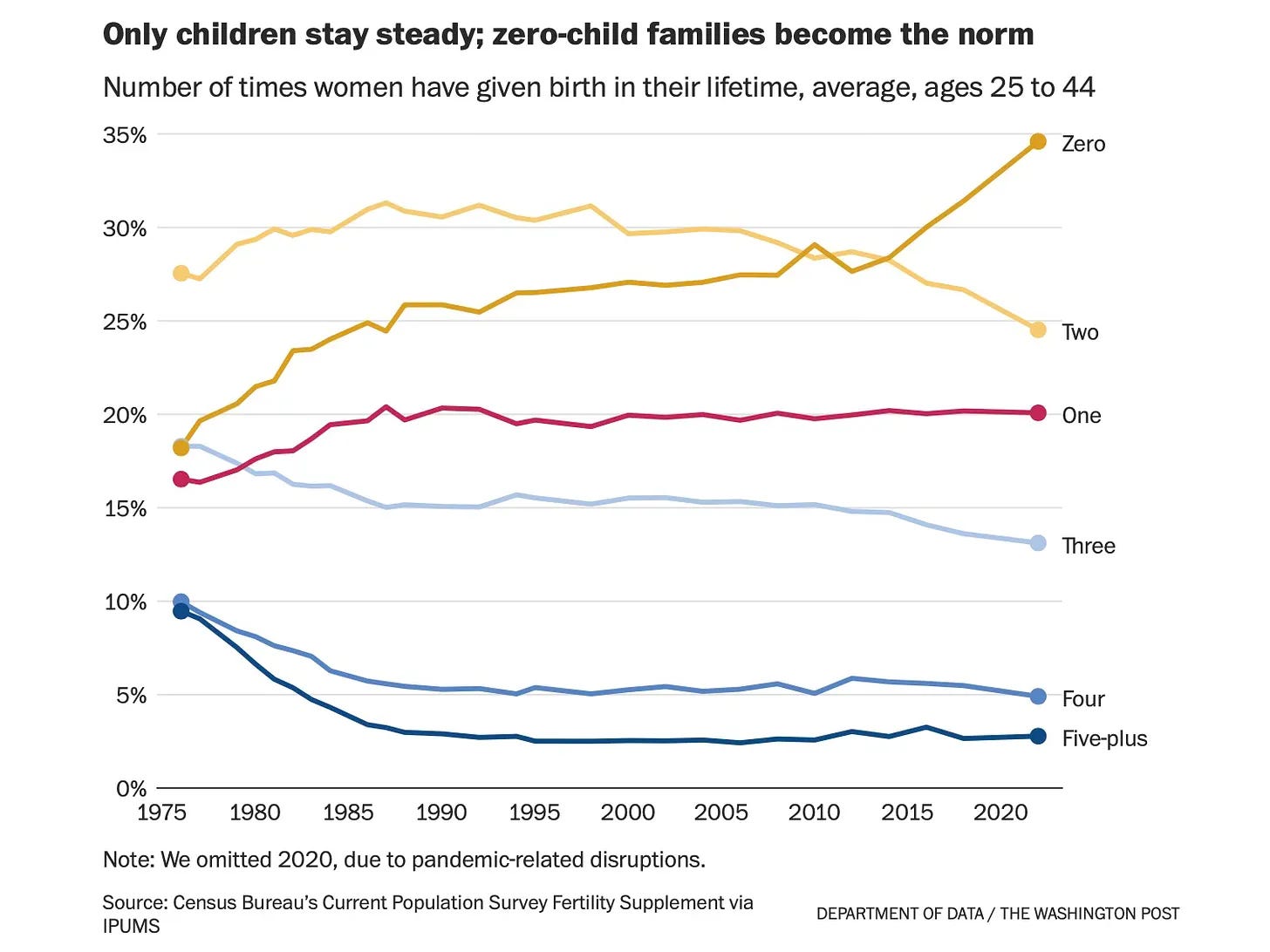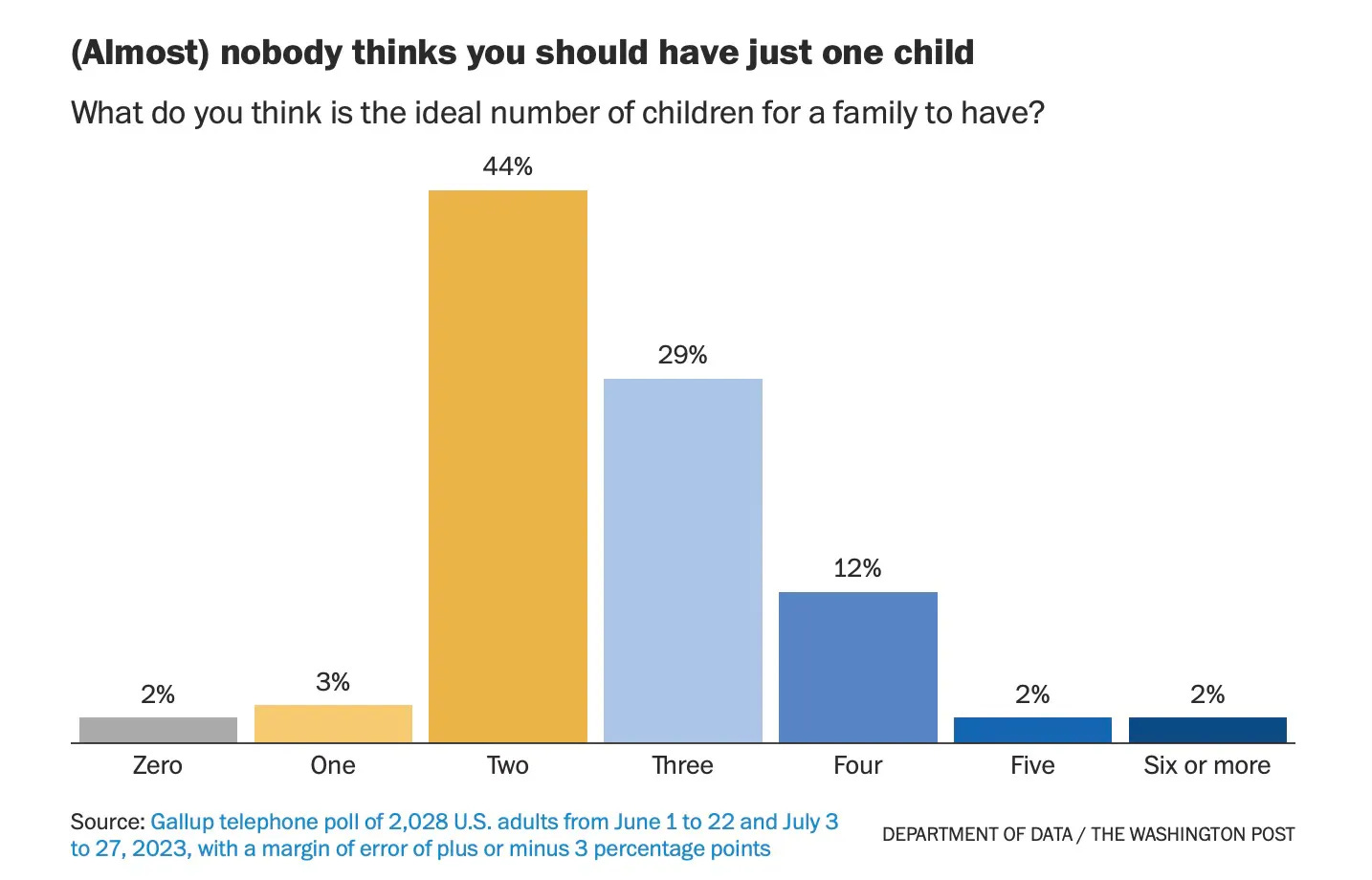Don't waste your time worrying about only children
I recently shared an article from The Atlantic on Instagram about only children and was surprised by the number of direct messages I received in response — some from women who worry about having an only child and some from women who worry about the only child they already have. And even though these women didn’t explicitly name their concerns, I assume they’re related the misinformation that society still spreads about only children: they’re lonely, spoiled and selfish.
But as both an only child and the mother of five, I want to assuage women’s fears: there are many, many things to worry about when it comes to having kids, but having an only child is not one of them.
“In the cultural consciousness, only children are frequently pegged as weirdos: maladjusted, selfish, spoiled, uncompromising, or just unusually precocious. We are at once pitied for our sibling-less childhood and judged for the supposed eccentricities it left us with,” Chiara Dello Joio in The Atlantic
Where do all of the stereotypes about only children come from? We have to go way back to 1896 when data from a very unscientific survey deemed all only children to be depressed narcissists. Those study results were used by Psychologist Granville Stanley Hall, founder of the American Psychological Association, to categorize only children as “strange, egotistical and withdrawn.” Hall also infamously referred to being an only child as “a disease.”
Nearly 25 years later, that same study was still being referenced: psychologist A. A. Brill wrote, “It would naturally be best for the individual and the [human] race if there were no only children.” And as recently as 1968, The New York Times ran an opinion piece by a professor of psychiatry at Emory University entitled, “The Only-Child Syndrome.” It argued that being an only child was so horrific that parents should adopt a second child if they were unable to have an additional biological child.
Even today — 125 years later — negative stereotypes about only children are impacting women’s decisions to have children. According to data from the Census Bureau, the rate at which Americans have had only children has remained absolutely flat since the mid-1980s, even though the U.S. birthrate is at its lowest level in history. In other words, women in the U.S. are choosing to have no children or two children over having just one child.
A recent Gallup study illuminates this data point: almost no one — just 3 percent of Americans — believes having one child is an ideal family size. Even study respondents who are actually the parents only children don’t think it’s an ideal family size — most respondents said having two (44 percent) or three (29 percent) children is most ideal. University of Texas psychologist Toni Falbo (who has studied only children such as herself since the mid-1970s) says Americans still believe having just one child amounts to “mistreating your child by not providing them with another sibling” thanks in large part to that 1896 study.
But no modern research indicates only children are negatively affected by the absence of siblings. Research does show that only children are not lonely at all — they’re also not more extroverted or introverted than other children, they’re not less sociable; and they’re not more selfish or unstable. In fact, onlies test higher in intelligence and creativity and have more ambitious educational goals than their peers with siblings — advantages attributed to parents with more resources and free time to focus on them. Other studies show that only children have stronger bonds with their parents compared with children who had siblings.
I was born an only child in 1971. I’m not sure if my parents set out to have just one child, but I do know they never tried to have another. I didn’t ask why — it was just the way my family was. Growing up an only child in the 1970s was pretty unique — only 13 percent of “completed American families” had one child (today, about 20 percent of households in the U.S. are one-child families). But I never suffered because of it, and I never wished for siblings. I didn’t feel different or isolated or that I was missing out. And I don’t remember a single time in my life when I’ve ever felt lonely — maybe that’s because I learned early on how to entertain myself. I also don’t believe I was (as a child) or am (as an adult) any more selfish, spoiled or narcissistic than the people I know who have siblings.*
“Only child syndrome is a theory referring to certain characteristics that people may associate with being an only child. However, there is no reliable evidence that being an only child significantly affects personality or behavior. Therefore, current research states that only child syndrome is not real,” Medical News Today
Are there things I missed out on as an only child? Probably, but I will never know! Do I ever wish I had that perfect sibling — someone who could be a friend and a confidant and even a caretaker? Maybe occasionally. But I know far too many people who have siblings whom they don’t like and, in some cases, can’t stand. It seems better to me to be an only child than to endure a genetic lottery that could spit out a sibling who is insufferable or even a maniac. The bottom line is that I don’t wish I had siblings any more than a child with siblings wishes they were an only child — you get what you get and there are benefits to both.
Yes, it’s possible your only child will turn out to be weird and unhappy, but that’s not because they’re an only child — having 10 children won’t guarantee a positive outcome any more than having only one will. And regardless of how many children you have, raising them will be equal parts difficult and rewarding. So for any and all women considering one-and-done parenting but feel guilty or conflicted — or for anyone who’s unable or uninterested in growing their family beyond one child for any reason — please know that having just one child is the last thing you should be worried about.
*I asked my kids and husband and they confirmed that this is a fair assessment.







